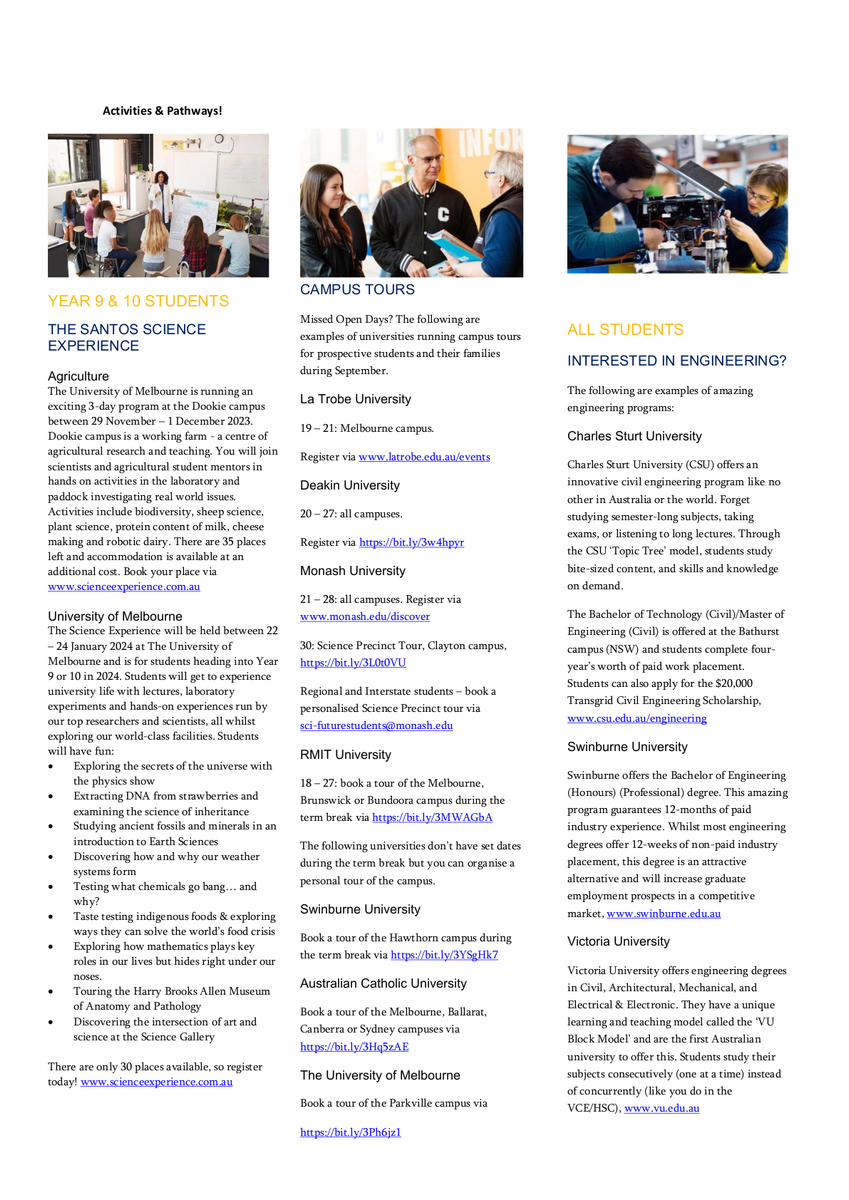Careers

Hello from the Careers team!
Everyone welcome!
All students are welcome to visit careers. We have an appointment book just outside each career’s office in the Malgobila and Wurrin Hubs.
Our office hours are:
| Locations | Hours |
|---|---|
| Senior Hub - Malgobila | 8.30 am - 4.00 pm Monday to Friday. |
| 8 and 9 Hub - Wurrin | 8.30 am - 4.00 pm Monday to Wednesday |
Upcoming Career Events
| Event | Date |
|---|---|
| Year 12 VTAC Applications | In Progress |
| Year 12 VTAC & Interstate Admission Centres – Application Period Open | 31st July - 28th September |
| Year 12 Preparation of VTAC Applications/Pathways | 1st August – 15th September |
Work Experience
Please note Year 10-12 Work Experience is now CLOSED for Term 3.
Only Current/Pending Applications will be processed.
Work Experience is available to students that are 15 years old+. Please drop into either careers Hub for further information.
SWL is available to students doing a VET Course in their VCE/VM Pathway. See the Work Placement Programs advisor.
SBAT’s are available to Year 10 -12 students through our Headstart Program (Aaron Patton) by application and availability only.
You can still prepare for Term 4 Work Experience by:
- Dropping in to the Careers Hubs for further information.
- Complete an Expression of Interest (EOI): Career Action Plan (CAP)/Safe@Work Certificates and obtain White Card* (If required – Building Industry placements)
It that time of year again – Check out these Exam Tips for success:
These tips can help you get ready for and get through your exams. They can also help you prepare for tests and class presentations, and tackle in-class assignments.
1. Find out about the exam
Know your enemy – find out as much as you can about the exam. Questions to ask include:
- How much is the exam worth to your overall mark in the subject?
- What type of exam is it (for example, multiple choice, essay, open book, take-home)?
- Will there be a choice of questions or tasks?
- How much will each question or task be worth?
2. Ask for help
Don’t feel bad if you need to ask for help. People you can talk to about exams include:
- teachers
- family members
- friends and fellow students.
If you’re feeling really stressed you might also find it helpful to speak to your teachers, wellbeing, family or a friend.
3. Sort out your subject material
Before starting to review a subject it helps to:
- check you have all of the handouts
- put your notes in order
- read over any course outline or subject guide
- write your own summaries of each textbook chapter or section of the subject guide.
Getting all your gear together makes it easier to find what you need while you’re studying.
4. Review past exam papers
Get your hands on any old exam papers from the subject and familiarise yourself with the structure and format.
Places you can get past exam papers from include:
- your teacher
- your school or university library
- the Victorian Curriculum Assessment Authority.
When reviewing, practise answering the questions within the specified time limits.
5. Know where to go
Make sure you know where and when the exam is happening. You don't want to miss your exam! Here's how to make sure that doesn't happen to you.
- Check your exam timetable for time and place details.
- Do a practise run to find out how long it takes to get there.
- Make a list of everything you need to take with you (for example, calculator, pencil, ruler).
- Do some study at the same time as your exams (for example, if you have an early morning exam, practise getting up and studying earlier in the day).
6. Don't cram
Staying up all night to cram will only stress you out. It's better to just review what you've already studied and get an early night. That way you'll be as refreshed as you can be on the day of your exam.
If you want to do some preparation the night before, keep it simple:
- Get all your materials together.
- Read over your notes.
- Test yourself on key concepts.
- Set your alarm.
7. Keep your cool
Fronting up to an exam can be nerve-wracking, but here are some tips for staying calm:
- Don’t talk too much to other students before the exam.
- Try to get there with time to spare so you don't arrive all rushed.
- Make sure you have a decent breakfast.
- Listen to some inspiring music on the way to the exam.
- Wear your lucky shirt or bring a lucky charm (if you have one).
8. Use your reading time
The way you use your reading time can really help you make the most of your exam time. Here are some ways to use your reading time well:
- Read all of the instructions very carefully.
- Scan the whole exam paper.
- Check how many pages there are.
- Check how much each question is worth (it helps to spend more time on heavier weighted questions).
- Plan which questions to answer first (consider starting with questions you're confident about).
- Plan how much time you'll spend on each answer or section.
- Start thinking about your answers.
9. Break the questions down
A great tip for any exam is to break the questions down to make sure you really understand what you’re being asked.
Look for the key parts of the question. These can give you clues on how to answer it.
For example, for the question, "Explain the difference between study and revision", you could split this question into four parts:
- Explain – Give reasons to show how or why something is the way it is.
- The difference – What are the distinguishing factors between study and revision?
- Study – What is study?
- Revision – What is revision?
10. Review your answers (if you can)
If you finish the exam before the time is up it's a good idea to go back over everything, even answers you're confident you got right. Try to:
- review as many answers as you can
- start with the questions you're least confident about
- make sure you've answered every question
- make sure you've answered every part of every question (some questions might have multiple parts).
Come up with your own strategies.
Remember – these tips are only some of the things that you can do to get the most out of your exams. There might be other things that work even better for you.
Ask around – find out what your friends do for their exams – maybe some of their tricks will work for you as well!
Your teachers will have some good recommendations too.
Activities and Pathways
Compass Newsfeeds
Student communication about careers and opportunities are updated weekly via the Compass newsfeed pages.
Career events, excursions, apprenticeship/traineeship opportunities, guest speakers, are shared with students via these alerts, so please keep an eye out for the latest opportunities.
Careers website
Bairnsdale Secondary College (bairnsdalesccareers.com)
Students and families have access to a variety of career resources and information via our designated careers website. Students can use career targets to help them identify career interests.
We look forward to seeing you in Careers soon!





